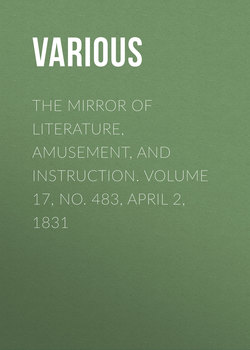Читать книгу The Mirror of Literature, Amusement, and Instruction. Volume 17, No. 483, April 2, 1831 - Various - Страница 2
RETROSPECTIVE GLEANINGS
ОглавлениеANCIENT BLACK BOOKS, &c
(For the Mirror.)
The Black Book of the Exchequer is said to have been composed in the year 1175, by Gervase of Tilbury, nephew of King Henry the Second. It contains a description of the court of England, as it then stood, its officers, their ranks, privileges, wages, perquisites, powers, and jurisdictions; and the revenues of the crown, both in money, grain, and cattle. Here we find, that for one shilling, as much bread might be bought as would serve a hundred men a whole day; and the price for a fat bullock was only twelve shillings, and a sheep four, &c. At the end of this book are the Annals of William of Worcester, which contain notes on the affairs of his own times.
The Black Book of the English Monasteries was a detail of the scandalous enormities practised in religious houses: compiled by order of the visiters, under King Henry the Eighth, to blacken them, and thus hasten their dissolution.
Books which relate to necromancy are called Black Books.
Black-rent, or Black-mail, was a certain rate of money, corn, cattle, or other consideration, paid (says Cowell) to men allied with robbers, to be by them protected from the danger of such as usually rob or steal.
P.T.W.
ANCIENT STATE OF PANCRAS
(For the Mirror.)
Brewer, in his “London and Middlesex,” says—“When a visitation of the church of Pancras was made, in the year 1251, there were only forty houses in the parish.” The desolate situation of the village, in the latter part of the 16th century, is emphatically described by Norden, in his “Speculum Britanniæ.” After noticing the solitary condition of the church, he says—“Yet about the structure have bin manie buildings, now decaied, leaving poore Pancrast without companie or comfort.” In some manuscript additions to his work, the same writer has the following observations:—“Although this place be, as it were, forsaken of all, and true men seldom frequent the same, but upon deveyne occasions, yet it is visayed by thieves, who assemble not there to pray, but to waite for prayer; and many fall into their handes, clothed, that are glad when they are escaped naked. Walk not there too late.”
Pancras is said to have been a parish before the Conquest, and is mentioned in Domesday Book. It derived its name from the saint to whom the church is dedicated—a youthful Phrygian nobleman, who suffered death under the Emperor Dioclesian, for his adherence to the Christian faith.
P.T.W.
SALT AMONG THE ANCIENT GREEKS
(For the Mirror.)
Potter, in his “Antiquities of Greece,” says—“Salt was commonly set before strangers, before they tasted the victuals provided for them; whereby was intimated, that as salt does consist of aqueous and terrene particles, mixed and united together, or as it is a concrete of several aqueous parts, so the stranger and the person by whom he was entertained should, from the time of their tasting salt together, maintain a constant union of love and friendship.”
Others tell us, that salt being apt to preserve flesh from corruption, signified, that the friendship which was then begun should be firm and lasting; and some, to mention no more different opinions concerning this matter, think, that a regard was had to the purifying quality of salt, which was commonly used in lustrations, and that it intimated that friendship ought to be free from all design and artifice, jealousy and suspicion.
It may be, the ground of this custom was only this, that salt was constantly used at all entertainments, both of the gods and men, whence a particular sanctity was believed to be lodged in it: it is hence called divine salt by Homer, and holy salt by others; and by placing of salt on the table, a sort of blessing was thought to be conveyed to them. To have eaten at the same table was esteemed an inviolable obligation to friendship; and to transgress the salt at the table—that is, to break the laws of hospitality, and to injure one by whom any person had been entertained—was accounted one of the blackest crimes: hence that exaggerating interrogation of Demosthenes, “Where is the salt? where the hospital tables?” for in despite of these, he had been the author of these troubles. And the crime of Paris in stealing Helena is aggravated by Cassandra, upon this consideration, that he had contemned the salt, and overturned the hospital table.
P.T.W.
